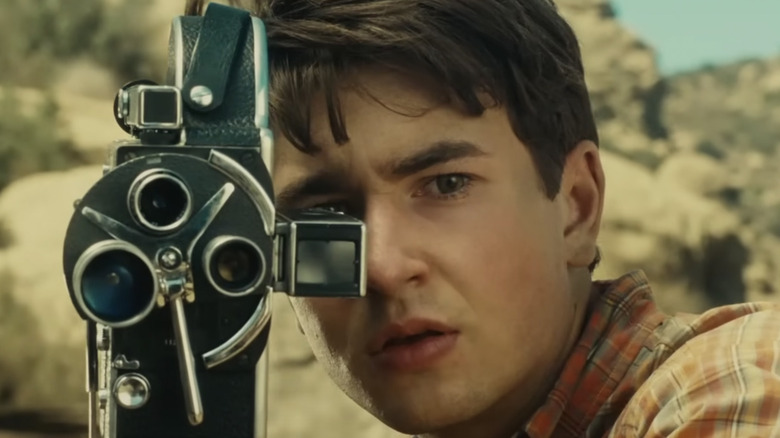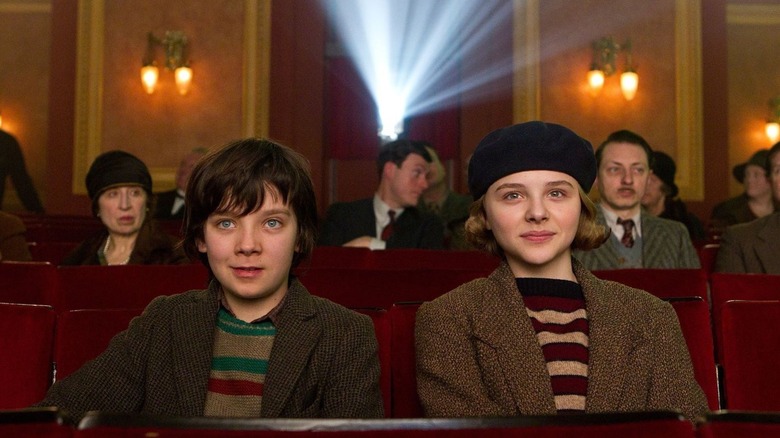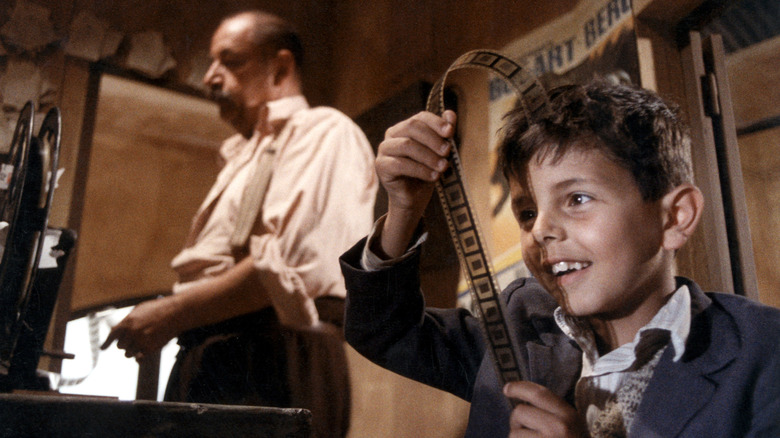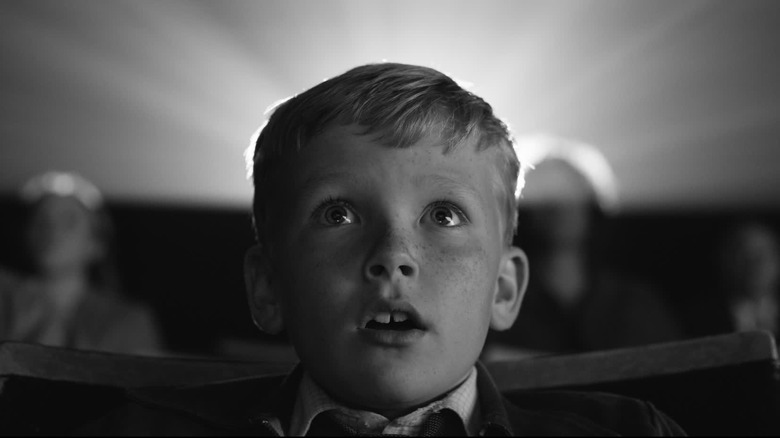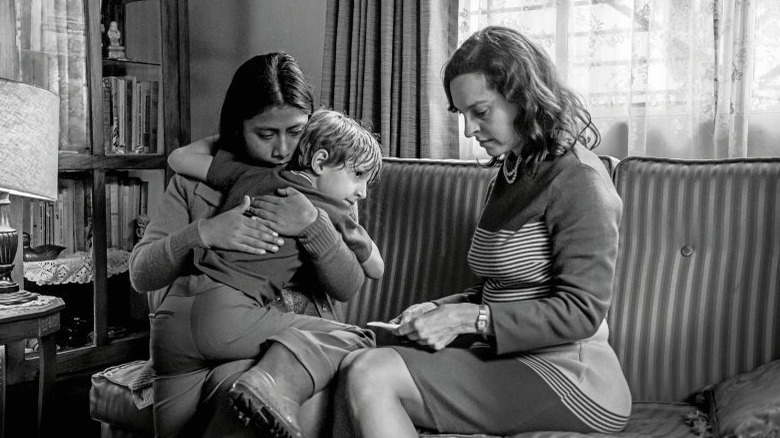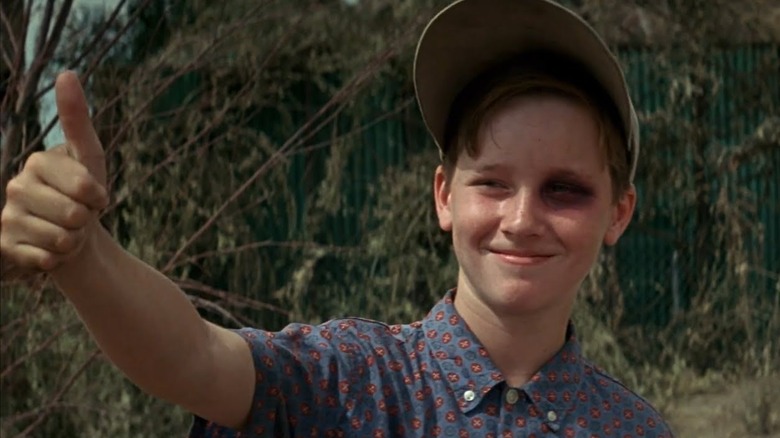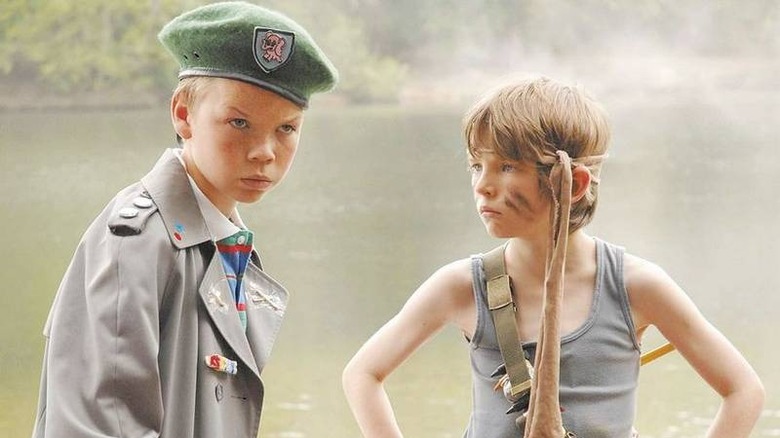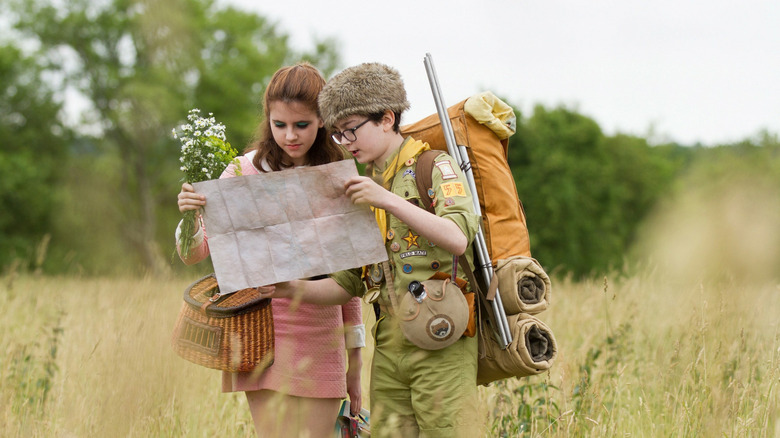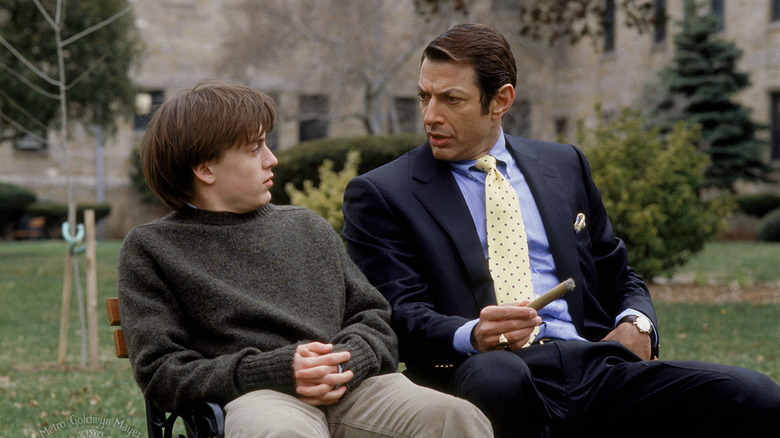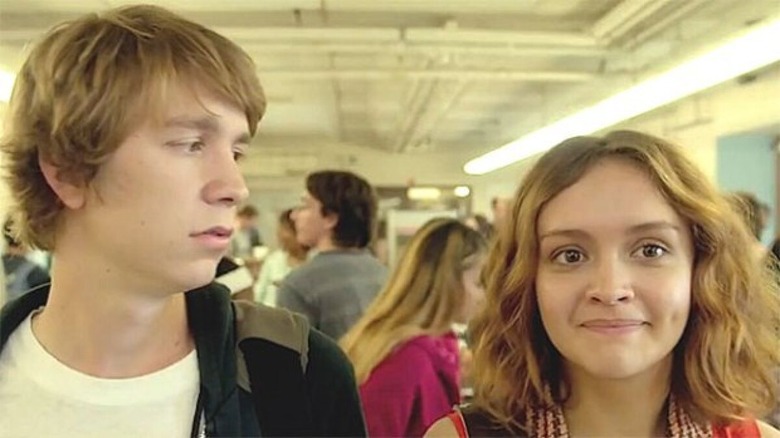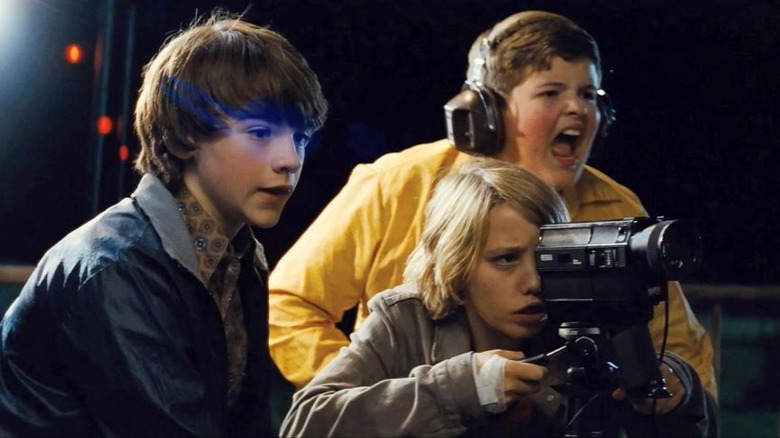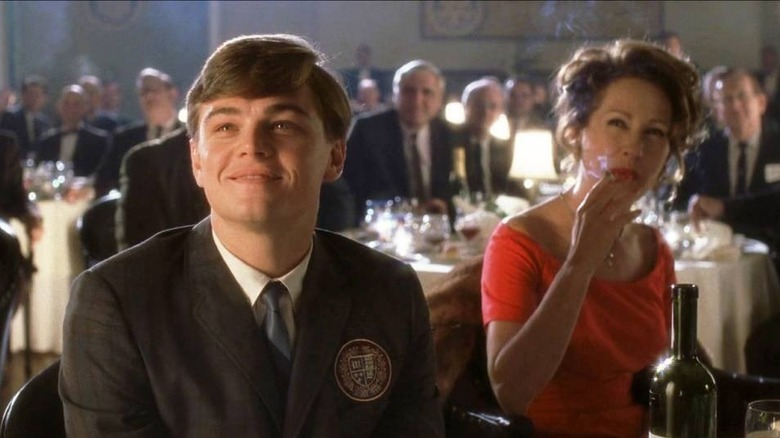12 Best Movies Like The Fabelmans To Watch Next
Steven Spielberg's "The Fabelmans" might seem like the sort of movie Hollywood doesn't make anymore. It's unapologetically earnest and nostalgic, a mostly feel-good coming-of-age story that pulls at the heartstrings of and elicits belly laughs from kids as well as adults. It has the hallmarks of an Oscar contender: Big performances, a whip-smart script, crisp and clever cinematography and editing, and a rousing score, all harmoniously united under one auteur's vision. It just so happens to be about how that one auteur's vision came to be.
"Fabelmans" — a fictionalized version of events from Spielberg's own childhood and early adulthood — is the famed filmmaker's most personal movie ever, which means for all its master level craftsmanship, it's also a surprisingly intimate, simply told story. Nothing about it is gimmicky, edgy, or subversive. There are no particularly important world events involved, and certainly no aliens, killer sharks or monsters.
But, though they aren't as ubiquitous as, say, comic book movies or horror flicks, "The Fabelmans" does continue a recent trend of directors using their medium of choice to look back on their lives and their careers. While many of these projects have proven to be successful, Spielberg's contribution to this emerging sub-genre is arguably the best of the bunch. It won an audience prize at the Toronto International Film Festival and is widely seen as the frontrunner going into this year's awards season. If "The Fabelmans" affected you as much as it did TIFF's voters and critics, below are 12 recommendations to keep the movie magic going.
Hugo (2011)
It seems like every legendary director has to make a movie about making movies, especially once they reach the golden years of their careers. And why not? Who better to tell us about cinema than the likes of Steven Spielberg or Martin Scorsese?
While Scorsese has traditionally leaned toward darker, more adult material than Spielberg on the whole, the mind behind "Taxi Driver" and "The Departed" took a break from the mean streets and mobsters of New York City and Boston to take viewers to the picture houses of Paris, France circa 1931. The result was a movie that, in keeping with Scorsese's reputation, was nominated for 11 Academy Awards.
"Hugo" — based on the book "The Invention of Hugo Cabret" — follows an orphaned boy (Asa Butterfield) hiding out in a train station and trying to evade an inspector (Sacha Baron Cohen). He steals spare parts in an effort to repair his deceased clockmaker father's automaton, and crosses paths with a toy shop owner named Georges (Ben Kingsley) and his goddaughter Isabelle (Chloë Grace Moretz).
"Hugo" is charmingly innocent and steampunk-y in its first half, and full of wonder and longing once its mystery begins to unfold. The kids' quest to get the wind-up robot operational again intersects with some instantly recognizable scenes from film history. "Hugo" the movie and Hugo the character are both as romantic about filmmaking as Sammy Fabelman. Though Hugo is less of an avatar for Scorsese than Sammy is for Spielberg, the young men end up in similar places. Like Spielberg, Scorsese is reckoning with boyhood, loss, young love, obsession, and artistic vision.
Cinema Paradiso (1988)
It's possible that no movie loves movies more than "Cinema Paradiso," and also possible that most of the films in this vein wouldn't exist without its blueprint.
This Giuseppe Tornatore film was such a massive hit with international awards bodies that it is often credited with revitalizing Italy's film industry. It begins in 1980s Rome, where a famous director named Salvatore Di Vita learns from his girlfriend that someone named Alfredo (Philippe Noiret) has died. This sad news unsettles Salvatore, and the rest of "Cinema Paradiso" is told in flashback as the audience learns why this mysterious Alfredo was so important to him. Viewers then meet that same director as an eight-year-old boy (played by Salvatore Cascio) in post-war Sicily. He goes by the nickname "Toto," and is about to learn what will become his trade.
Rambunctious but idle, the boy wanders into a local picture house (the titular Cinema Paradiso) where he makes the acquaintance of the grumpy projectionist, Alfredo. The man (somewhat begrudgingly at first) becomes Toto's closest friend as well as his mentor and father figure. The kid lost his dad in World War II. During their time together, Toto goes from watching movies for free from the projection booth to learning how to edit film (the prudish owner of the theater makes Alfredo cut out the kissing scenes). But an unforeseen tragedy disrupts the projectionist and his pint-sized assistant's happy routine. Their relationship is forever changed, as is Toto's relationship to movies. Like "The Fabelmans," there's also a romantic subplot about a mismatched couple, and a memorable, all-time great ending.
Belfast (2021)
Movies aren't as central to "Belfast" as they are to "The Fabelmans," "Hugo," or "Cinema Paradiso," but Kenneth Branagh's Oscar nominated 2021 film does boast a scene in which an awestruck kid is backlit by a projector.
Besides that, "Belfast" probably has the most in common with "The Fabelmans" in terms of its plot. This black and white coming-of-age story is the well-known writer/director/actor's dramatization of his own childhood in Northern Ireland. Both take place around the same time. But while "The Fabelmans" spans the '50s and '60s, "Belfast" is set in 1969. Like Spielberg stand-in Sammy, Branagh stand-in Buddy (Jude Hill) is a lovable odd duck of a boy, torn between good but flawed parents (Jamie Dornan and Caitríona Balfe) who aren't getting along during a time of political upheaval. He falls for a girl of a different faith sect, faces the prospect of moving when he doesn't want to, but still experiences a string of happy memories throughout all the tumult and strife.
Both boys have a charismatic, free-spirited mother, a downtrodden father, and quirky grandparents (Ciarán Hinds and Judi Dench). Both have to look out for their siblings and navigate bullies, and both struggle to understand the prejudice that poisons their worlds. "Belfast" is more narrowly focused on The Troubles and on one chapter of Branagh's life, while "The Fabelmans" tries to cover more territory. But each director is able to spin a yarn that is equal parts warm, funny, and tragic from their memories. "Belfast" — which is one of the inconsistent Branagh's best efforts in ages — ends on a decidedly different note than "The Fabelmans," though one's that's no less meaningful and satisfying.
Roma (2018)
Spielberg is at least the fifth director in recent years to put out a fictionalized autobiography of his childhood. In addition to "Belfast," there's also Terrence Malik's 2011 film "Tree of Life" and James Gray's "Armageddon Time." Netflix bankrolled Alfonso Cuarón's 2018 drama, "Roma," another black and white cinematic memoir that was nominated for 10 Academy Awards.
"Roma" (which also features a film appreciation scene, albeit a more depressing one) touches on many of the same themes as the rest. There's class tension, marital tension, political tension, but it's markedly more serious and less concerned with the self. Rather than telling the straightforward tale of his boyhood years, the Mexican writer-director decided to center a character named Cleo, based on his real-life housekeeper and caretaker.
Cleo (Yalitza Aparicio) is indigenous and working class, while the family who employs her is upper middle class and of Spanish descent. The children — Pepe, Paco, Toño, and Sofi — begin to realize that their parents — Sofía (Marina de Tavira) and Antonio (Fernando Grediaga) — aren't the enviably perfect couple they project themselves to be.
Their doctor father is emotionally cold and never home, their bitter and frustrated mother's anger surfaces unpredictably. She's stifled by her position as a mother and housewife, especially since they're paying someone else to do the childrearing and the cleaning, and Paco unintentionally discovers what he thinks might be proof of' infidelity. The story is set in 1970, a year after "Belfast" and around the time "The Fabelmans" leaves off. While those two films are plenty deep and extremely relatable, "Roma" deserves extra credit for grounding Cleo's much more urgent, heart-wrenching problems against an affluent backdrop.
Boyhood (2014)
Richard Linklater's "Boyhood" isn't autobiographical in the same way "The Fabelmans" is, but it follows a similar coming-of-age trajectory. What makes it stand out, however, is that the film really does follow a boy for more than a decade as he comes of age, capturing every pimple, growth spurt and bad haircut as no hair and makeup team ever could.
Its protagonist, Mason Evans Jr., feels adrift in the wake of his parents' divorce. He wonders which of his imperfect parents he takes after. He and his sister have to move. He meets and breaks up with girls and deals with bullies, all while trying to carve out an identity for himself, and he develops a passion for photography. If they were contemporaries ("Boyhood" takes place in the 2000s), Sammy Fabelman and Mason Evans Jr. would undoubtedly be friends.
The main difference is, in this drama, the same kid (Ellar Coltrane) literally comes of age as Mason, playing the boy from ages 6 to 18. "Boyhood" was filmed over a 12-year period, which allowed the cast to mature naturally along with the characters they played, to stunning effect. Patricia Arquette and Ethan Hawke portray his mother and father.
The film's inventive verisimilitude earned it stellar reviews and box office receipts as well as a plethora of awards, despite the fact it is nearly three hours long and not very plot driven (something else it has in common with "The Fabelmans"). "Boyhood" — which is rated R — also broaches subject matter such as sex and contraception, abuse, alcoholism and drug use, financial difficulty, and the Iraq and Afghanistan Wars. It's for a more specific audience and comes to some heartfelt conclusions about Mason's childhood and burgeoning career as a photographer.
The Sandlot (1993)
A modest hit when it premiered in 1993, "The Sandlot" has since become such a cult classic. Of course, what everyone remembers about "The Sandlot" is the baseball, but what everyone loves about "The Sandlot" is the way it explores themes of friendship and perseverance.
It might be about backyard ball instead of backyard filmmaking, but otherwise, many of the same moves have gone into this game plan. "The Sandlot" takes place in a California suburb in 1962, so the fashions and the architecture of the day would look familiar to Sammy Fabelman. In similar circumstances to Sammy, Scott Smalls (Tom Guiry) has had to move to the Golden State in the fallout of his parents' failed marriage.
Once there, he has to make new friends and find a way to get along with his new stepfather (Denis Leary). This is a challenge and a test to his self-esteem, as he struggles to fit into already established in-crowds because of his timid nature and lack of athletic prowess. Like Sammy, Smalls is fascinated by but terrified of girls. He has ambitions beyond his new hometown and this phase of his life, but he's grateful to have found friends and happiness in the meantime.
Though Smalls does not become a filmmaker, he does discover his calling because of Benny (Mike Vitar) and the rest of the crew. Its tone is slightly more irreverent (though one has a badly behaved pet monkey while the other has a big bad of a mastiff), but in much the same way as "The Fabelmans," "The Sandlot" is a story about achieving greatness someday because of the people — for better or worse — who helped get you there.
Son of Rambow (2007)
"Son of Rambow" is what might have become of Sammy Fabelman if he'd been raised by religious zealots in 1980s England and befriended a kid who was simultaneously the best and worst of influences. A young Will Poulter plays that influence, Lee, a troubled kid who dreams of making movies. He meets Will (Bill Milner), a student whose strict Christian parents won't let him watch movies or TV, which means he has to leave the classroom whenever a teacher puts one on at school. Through Lee, Will gets an education, beginning with the film "First Blood" and star Sylvester Stallone as Rambo.
The wannabe directors and action stars get to work engaging in sometimes dangerous behavior in order to get the shot, with Will — thrilled at the chance to express his creativity — contributing more of his own ideas. But he has to keep his newfound friendship and hobby a secret, as his family and church wouldn't approve. An influx of French exchange students balloons interest in Lee's amateur film, which eventually causes a rift between the collaborators.
Though it's fittingly scrappier than "The Fabelmans," "Son of Rambow" explores many of the same themes, including Will's disillusionment with his parents and his efforts to get them to support his individuality, as well as the complicated social dynamics of who's popular and who's not in school, and why. It's also just as interested in and enamored of the filmmaking process itself.
Moonrise Kingdom (2012)
Wes Anderson's 2012 wistful, tween romantic comedy isn't autobiographical on the whole, but it's inspired by his childhood memories and fantasies. Much like Sammy Fabelman, when he was a teen and a boy scout, Anderson's parents were in the process of splitting up and he relied on his imagination to emotionally escape. The resulting film isn't really about Anderson per se, but about young love and yearning. It also happens to be about another unusually insightful boy named Sam living in the 1960s.
This Sam (Jared Gilman) is a foster kid attending a scout camp on an island off the coast of New England. His pen pal and true love Suzy (Kara Hayward), who he met the year before, lives on that island with her brothers and well-to-do lawyer parents. The pair conspires to run away together; Sam skips out on camp just as Suzy escapes her idyllic house, not-to-subtly deemed Summer's End. The first step of their plan is hiding out and living off the grid in a tent, and learning how to fish, gather, and entertain themselves. But of course, it's not long before the scout leader (Edward Norton), Suzy's parents (Bill Murray and Frances McDormand), and a social worker (Tilda Swinton) realize the kids are missing. However, the local police captain (Bruce Willis) is sympathetic to the young lovebirds, particularly as he learns more about Sam's past and the prospect of a hurricane looms.
Igby Goes Down (2002)
This Burr Steers dramedy features a top-notch ensemble cast, its story told from the perspective of a disaffected teenager.
Jason Slocumb Jr., who's gone by the name Igby (Kieran Culkin) since early childhood, belongs to a blue-blooded family full of malcontent characters whom he low-key hates. There's his father (Bill Pullman), who suffers from mental illness and is currently institutionalized. There's his mother (Susan Sarandon), an over-the-top, self-indulgent personality who rubs Igby the wrong way. There's his conservative economics major brother (Ryan Phillippe), whom he considers a fascist. Then there's his godfather, a real estate developer (Jeff Goldbum), to whom Igby is sent when he flunks out of practically every prep school and military academy in the Northeast.
Like Sammy Fabelman, Igby is trying to figure out who he is and who he could be based on the available information from his parents. Since he's always been a tormented child, he worries his youth has been a precursor for something worse ... specifically, that he'll inherit his father's schizophrenia. But he also frets that he'll be an unstable, unpleasant drunk like his mom, or entitled and callous like his older brother and the types of people that are generally in his social strata. Igby has to navigate bullies, girls, and ambition like Sammy, but he finds less meaning in all of it, to the point of nihilism until a last act double twist jolts Igby out of his malaise. "Igby Goes Down" is more dark and sour than "The Fabelmans," though critics and audiences appreciated it for its refreshing emotional honesty.
Me and Earl and the Dying Girl (2015)
The title of this bittersweet 2015 friendship-centric film sums up most of its plot. "Me and Earl and the Dying Girl" is about the relationships forged between three misfit teens, one of whom is battling cancer. But, like "The Fabelmans," it's also about the medium of film and how it affects our perception of the world around us, as well as what might compel someone to choose it as their career.
Greg (Thomas Mann) is an amateur filmmaker content to be a loner at his Pittsburgh high school. His only sort-of pal is Earl (RJ Cyler), another outcast with whom he makes short parody movies with titles such as "Senior Citizen Kane" and "The Janitor of Oz." When Greg learns that a girl he once knew has been diagnosed with leukemia, his parents make him rekindle his friendship with Rachel (Olivia Cooke) out of sympathy. This proves awkward at first, but doesn't stay that way for long. As if Sammy and Monica had a third wheel, Greg, Earl, and Rachel spend time watching and making movies together. As Rachel gets sicker, Greg becomes obsessed with finishing a film he plans to dedicate to her, to the detriment of his actual relationships and college plans. In the end, he's forced to face hard truths and difficult decisions about his personal and professional life.
Just as "The Fabelmans" uses clever camera tricks and in-jokes to make meta commentary, "Me and Earl and the Dying Girl" breaks the fourth wall and plays with its narrative reliability to spectacular if devastating effect.
Super 8 (2011)
More fantastic than most, "Super 8" isn't strictly realistic. But this 2011 sci-fi thriller from writer/director J.J. Abrams happens to have been produced by one Mr. Steven Spielberg, and underneath all its genre conventions is a sweet, nostalgic story about kids with a camera.
Set in 1979, "Super 8" tells the story of six teenage friends who set out to make a zombie movie they hope to enter in a contest. One of the kids, Joe (Joel Courtney) recently lost his mother in an accident, while the father of the only girl in the group, Alice (Elle Fanning), is implicated indirectly in her death. Charles (Riley Griffiths) is the one with the equipment. Perhaps taking inspiration from movies like "The Greatest Show on Earth," the kids decide to set their Super 8 movie at a train station. While Sammy only witnessed a staged train derailment before re-creating one of his own with his toy engine, Joe and friends witness a very real one. It's bad enough that their teacher is hurt in the wreckage, but things get much scarier and stranger from there. The friends have to stick together not just to finish their zombie movie, but to survive a military conspiracy and possible otherworldly attack.
It would spoil the film to say more. With its young and plucky protagonists, sentimentalism, and enthusiasm for blockbuster-style movies, "Super 8" is reminiscent of Spielberg's early work. But it's also a tribute to the Spielberg and Abrams type of director in their youth, represented by Sammy Fabelman and characters like Joe and Charles.
Catch Me If You Can (2002)
"The Fabelmans" isn't remotely the first Spielberg movie to grapple with his parents' divorce. From "E.T." to the "Jurassic Park" franchise, broken and blended families can be found throughout the director's catalog. "The Fabelmans" might be his most personal film now, but prior to that, one could make the case for "Catch Me If You Can," his well-received 2002 true crime dramedy.
Set in the 1960s, "Catch Me" begins with the Abagnale family in a good place. Frank Jr. (Leonardo DiCaprio) idolizes his successful father Frank Sr. (an Oscar nominated Christopher Walken) and his sophisticated French mother, Paula (Nathalie Baye). But before he's out of school, his image of his folks is shattered. His dad's a con man and his mom's been having an affair with his father's friend. Unable to handle the many life changes that he knows are coming his way (divorce, having to move), Frank bolts and starts paying his bills by running his own scams.
He starts small, posing as a substitute teacher on a whim, but before long, he's impersonating airline pilots, lawyers, doctors, and Secret Service agents (not to mentioning wooing flight attendants and nurses). All the while, Detective Hanratty (Tom Hanks) is in pursuit. He's Frank Jr.'s enemy and his only confidant as he frantically searches the world for happiness, security, and legitimacy ... all things taken from him with the loss of his nuclear family.
